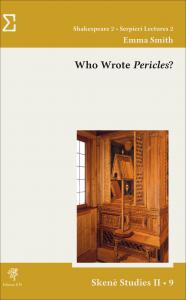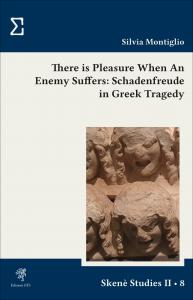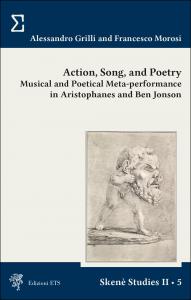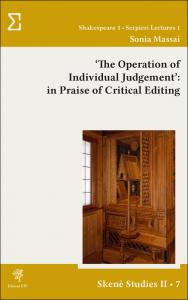|
Founded in 2014 as a supplement to Skenè. Journal of Theatre and Drama Studies Skenè. Texts and Studies is an online and print-on-demand series of volumes including annotated editions of drama texts and primary sources on the theory, practice, and history of theatre and drama as well as original book-length studies on the theory and practice of drama. The series also aims at furthering original research by producing texts hitherto unpublished. General Editors: Guido Avezzù, Silvia Bigliazzi Editorial Board: Chiara Battisti, Simona Brunetti, Sidia Fiorato, Felice Gambin, Alessandro Grilli, Nicola Pasqualicchio, Susan Payne, Cristiano Ragni, Emanuel Stelzer, Gherardo Ugolini Managing Editors: Valentina Adami, Cristiano Ragni The series includes three sections:TEXTS, STUDIES I, and STUDIES II. Skenè. Texts and Studies, is a CC-BY 4.0 publication (https://creativecommons.org/licenses/by/4.0/). This Licence allows others to share the work with an acknowledgement of the work’s authorship and initial publication in this Series, providing a link to the Licence and explicitly underlining any change (mention of DOI is required). This is a peer reviewed series. ISSN 2464-9295 |
 |
Who Wrote Pericles?
Collana: Skene' Texts and Studies - Studies II (9)
That George Wilkins was Shakespeare’s collaborator on Pericles is a conjecture turned fact in Shakespeare Studies. Although Emma Smith does not challenge that attribution, her lecture explores the wider cultural and interpretative work the standard division of labour between ... |
|
 |
There is Pleasure When An Enemy Suffers: Schadenfreude in Greek Tragedy
Collana: Skene' Texts and Studies - Studies II (8)
Schadenfreude, a German term but largely used in English as in other languages, means “joy in other people’s misfortunes”. It is a special emotion, which provides a malicious pleasure; it is tied up with envy, though it can also help improve one’s self-esteem or ... |
|
 |
Leon Modena's Kinah Shemor
Collana: Skene' Texts and Studies - Studies II (6)
In 1584, shortly after his bar-mitzvah, the young Italian Jew Leon Modena (1571-1648) composed an eight-line poem so remarkable that it has never been rivalled in its own genre. ... |
|
 |
Action, Song, and Poetry
Collana: Skene' Texts and Studies - Studies II (5)
That a strong relationship must have existed between Ben Jonson’s theatre works and Aristophanes’ plays is a long-standing scholarly commonplace. The question, however, has hardly ever been approached from a truly comparative perspective, taking into account the ... |
|
 |
‘The Operation of Individual Judgement’: in Praise of Critical Editing
Collana: Skene' Texts and Studies - Studies II (3)
The topic of the inaugural ‘Alessandro Serpieri Lecture’ from which this essay developed – what ‘critical editing’ means and how it affects current editorial practice – reflects areas of research interest that defined this scholar’s lifework and that ... |
|